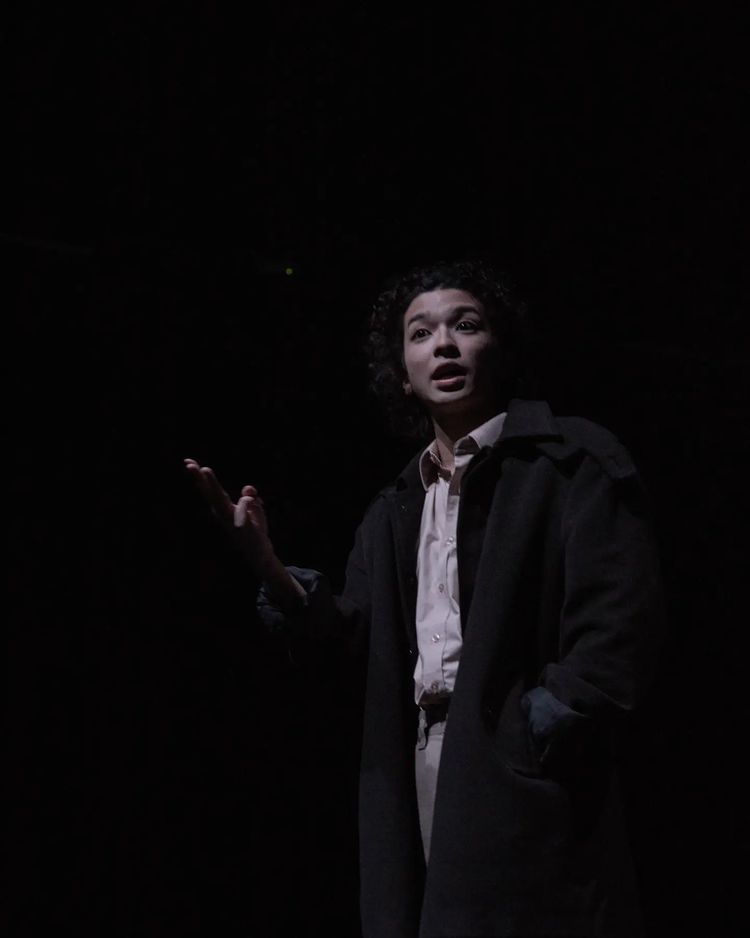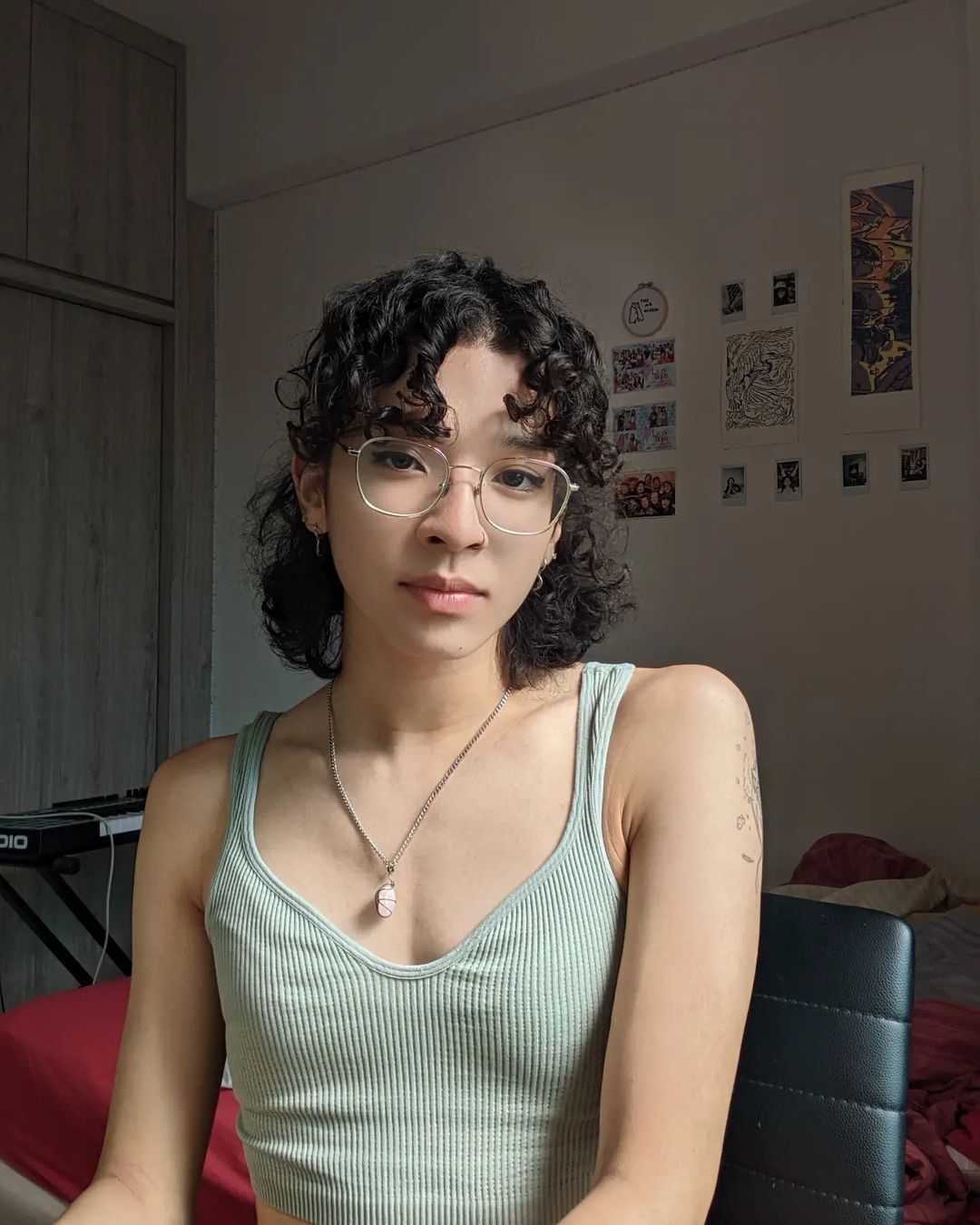All images and videos by Medli Loo unless otherwise stated
“Hi everyone, it’s transition update time,” Medli announces in a TikTok video. She has on a blue-red striped pullover and several ear and nasal piercings, sharing casually about her voice, skin complexion, and hair growth changes after seven months of hormone replacement therapy (HRT)—a medication process that helps her to transition from male to female.
This video is a dip into a series of transition updates and slice-of-life videos of Medli Loo, an 18-year-old thespian who has been on HRT for almost 14 months.
ADVERTISEMENT
The raw honesty in her words was what I found endearing and insightful about her TikTok videos. Rarely have I seen someone from the local trans community share about their transitioning experiences so openly.
After all, matters of the trans community often take place behind closed doors, subdued by unfavourable government stance and conservative social climate. The heavy social stigma following a trans person coming out publicly can incapacitate several aspects of their life, such as employment opportunities and schooling experience.
In a 2020 survey by Transgender SG, 50 per cent of the survey respondents said that general transphobia and discrimination towards trans and non-binary people was a significant barrier to finding employment, while 44.8 per cent of the student respondents revealed that they were forced to use a toilet facility that did not match their gender identity.
Despite growing up in such an unforgiving environment, Medli goes against the grain and chooses to share her transitioning journey publicly, standing her ground against a social climate that could stifle her potential.
Medli, on the trans community today
“It’s true. In Singapore, you don’t see a lot of openly trans girls, especially at my age,” Medli replies over Zoom when I asked if she knows of other trans teens such as herself actively sharing their transitions on social media.
Because of this, it is very common for younger members of the trans community to feel isolated, Medli points out. It’s further exacerbated by how the local community treats queer people.
“There are Asian values and toxic masculinity in our society. For many who are assigned male at birth, so many expectations are put on them because of their presumed gender, and it’s unhealthy.”
Being publicly out as a trans girl has also affected Medli’s job opportunities. As a budding actress, she shares that around 70% of the roles in the acting field are no longer open to her.
“Legally, I’m not allowed to be on Singapore TV anymore. I would be a positive representation of the LGBTQ+ community,” Medli adds, “and for musical theatre, I can’t take on many female roles since I have a stereotypical male singing voice.”
Even with the possibility of facing backlash in her career, Medli still chose to be open about her transitioning experience. When I asked her why she simply flashed an enigmatic smile.
ADVERTISEMENT

Pre-transition
Growing up, Medli remembers being confused about the concept of gender and feeling isolated in her experience. To cope, she had turned to others like her—online. Medli often found herself bingeing on YouTube videos about gender transitioning by trans girl personalities like AJ Clementine, Samantha Lux, and Gigi Gorgeous.
It was a temporary distraction to Medli then—transitioning had been a distant and unattainable dream. These personalities are the only trans women she knew of and are usually from faraway countries like Canada, Australia, and America. Never Singapore.
When she was 13, however, a life-changing encounter with a trans senior in school taught Medli the values of self-acceptance. “I learned that it was okay for me to be me, despite my age and location,” Medli tells me, her eyes glimmering with pride. “Just seeing my senior live her life authentically gave me hope, and it encouraged me to start transitioning.”
Growing pains
However, being in a local education system hindered young Medli from presenting herself as a girl.
ADVERTISEMENT
“For Singapore schools, those assigned male at birth were not allowed to have long hair,” she says plainly, “So I started experimenting with my clothes first, like painting my nails, putting on makeup, or wearing skirts and dresses.”
A 2020 survey by Transgender SG reflected the lack of school support for transgender and non-binary students, revealing that some transgender students are still made to wear gender-binary uniforms and are addressed with the wrong pronouns and their dead names—a name given to them at birth that they do not identify with.
This has made transitioning a rough start for many trans students like Medli. “Unlike a lot of other trans girls, who would present themselves as their gender before they go on hormone therapy, I still presented as a male, even when I started HRT.”
Subsequently, Medli started looking into the local options available for HRT. Transgender SG was a life-saving resource tool as it was where she discovered the places in Singapore that offer hormone therapy treatments legally.
Public HRT referrers—polyclinics and the Institute of Mental Health’s (IMH) gender clinic—had been Medli’s first choice for obtaining HRT medication since it is more affordable than private organisations. However, she has been unable to secure an appointment at the IMH gender clinic even after a year due to the long waiting time.
Luckily, with the financial support from her supportive parents, Medli could turn to private alternatives instead to get her HRT medication. However, many others are not as fortunate as her to afford private healthcare. Such is the sobering reality of obtaining hormone therapy in Singapore.
“I know of some trans teens who can’t even get an appointment for HRT at all because the waiting time is so long. It’s so unfortunate because many of these people can only afford to get HRT through public healthcare.”
The limited public healthcare support available, Medli explains, is another stumbling block that prevents younger trans people from comfortably presenting themselves in their gender.
Begin again
Thankfully, her first appointment with the gender clinic last April went smoothly. She had to undergo a blood test, amongst other assessments to assess for suitability, before the doctor prescribed her a month’s worth of HRT medication at her behest.
After the first month on HRT medication, Medli began noticing the changes in her chest; how it became increasingly sore before developing. Her skin also started clearing up.
Still, these physical differences are not apparent in the short run. “Transitioning is a prolonged and gradual process, so changes are accumulative,” she shares. “Furthermore, the physical changes like fat distribution to the breast, and texturally softer skin, are quite easy to hide.”
Medli explained how those who saw her every day, like her schoolmates and teachers, did not realise that she had been on HRT medication for eight months.
Laughing, she recounts an encounter in school where a schoolmate had noticed that she was wearing something underneath her uniform but remained clueless to the fact that it was a sports bra.
“He asked me if I was wearing two shirts,” Medli says, eyes glittering with playful glee. “I just pretended that I didn’t know what he was talking about.”
However, being on HRT medication also drastically affected Medli’s mental health. “I was thinking of stopping after the first month because I felt awful, and at the beginning, the medication got me to a really bad place,” Medli says plainly. “It was depressing.”
Towards an empowering beginning
It took months for Medli to recover from the reeling emotional changes of hormone therapy, but when it did, she was in a much better headspace than pre-transition.
For one, Medli observed that her sex drive, previously driven by testosterone, had reduced drastically after starting hormone therapy. “I hated having a high sex drive—I finally felt like a normal human being,” Medli says, smiling. “It’s insanely powerful to have the correct hormones in your body.”
Medli’s choice to openly share her transition journey online is a deliberate one. She remembers how her senior from school was her saving grace from the deep isolation she felt on this journey. That is what motivated her to be a support system for younger trans girls who are struggling with gender dysphoria. She also wants them to know that there are ways to overcome this complexity.
“I’ve only started passing as a female one or two months ago, enough to blend into society. I used to hate how I look, but that happens a lot less now, and I’m being perceived by people the way I want to be perceived, which is very freeing.”
“Gender transitioning is life-saving. To see yourself, after seeing someone who didn’t feel like ‘you’ your entire life, can be very emotional. I want those struggling with gender dysphoria to experience that too.”
*This story has been updated for accuracy on 13/07/22






